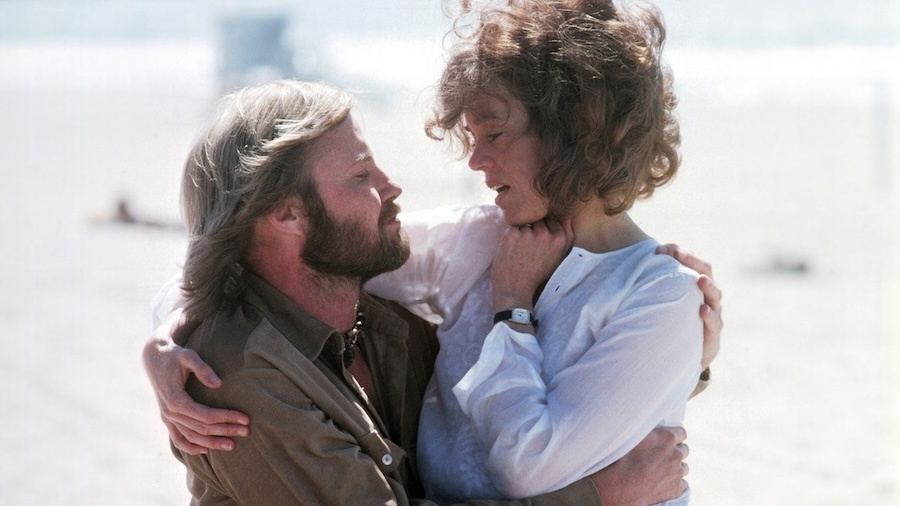
A MAN WHO BELIEVED IN WAR! A MAN WHO BELIEVED IN NOTHING! AND A WOMAN WHO BELIEVED IN BOTH OF THEM!

One of the most important moments in this critically lauded but perhaps slightly forgotten film is a sex scene. Jane Fonda, who was a driving force behind the project, was reluctant to include a scene where her character has sex with Jon Voight’s paraplegic, but she changed her mind after having a very frank conversation with a girl who was in a relationship with a guy in a wheelchair. Fonda’s honest questions and the explicit answers she got helped her see that it was important to show the audience how her and Voight’s characters were able to enjoy each other in bed.
The film was a hit and some time later, Fonda’s paraplegic friend Ron Kovic thanked her for helping him have a much better sex life.
Volunteers at a local VA hospital
The story begins in 1968. Bob Hyde (Bruce Dern), a captain in the Marine Corps, is about to be deployed to Vietnam and he’s optimistic. Sally (Jane Fonda) is his loyal wife, the kind who always stands by her man. Some time later though, she begins to feel her life changing. She moves to a new apartment and volunteers at a local VA hospital in California. That’s where she meets Luke Martin (Jon Voight), a former high-school class mate who came back from Vietnam a paraplegic. Filled with anger, Luke is unpleasant and hostile, but as he becomes more mobile and gets used to his wheelchair, Luke and Sally get closer to each other and begin to fall in love. At the same time, Luke becomes more vocal about his opposition to the war, attracting unwanted attention…
Greater authenticity
Ron Kovic is better known as the author of ”Born on the Fourth of July”, the autobiography that became a brilliant Oliver Stone movie; Coming Home fell in the shadow of it, but also The Deer Hunter, which premiered the same year as Coming Home, was an artistically superior depiction of what kind of horrors awaited those who fought in the Vietnam War. Still, I can imagine more than a few veterans who would prefer Coming Home because its authenticity is greater, evident already in the first scene where a group of veterans are talking about the war and their emotions, while Voight’s character stays silent, listening to what they have to say. Not only was Kovic a friend of Fonda’s since her activist days during the war, but she made sure that this pet project of hers was well-researched. It also strikes a neat balance between light and darkness, using Luke as a symbol of the bitterness and hurt afflicting veterans, but also the psychological recovery that many experience, finding a way back to a satisfying life.
The actors bring life to the characters, including Jane Fonda as the conservative wife who breaks free from her lifestyle.
This is indeed a love story, beautifully depicted by the cast and filmmakers, but the tragedy of the war is always present; suicide is a constant threat among the veterans. The actors bring life to the characters, including Fonda as the conservative wife who breaks free from her lifestyle and learns how to have an orgasm (I told you the sex scene was important); Voight as the veteran who finds a path forward; and Dern as the warrior who is destroyed, in every way, by the war. The music score cunningly uses 1960s pop hits to take us back to the era, an idea that wasn’t as common then as it is now.
Perhaps the film is too obvious at times, especially when it comes to its politics. But it’s also a film that takes veterans’ suffering seriously, unlike many rightwing critics who kept attacking Fonda during the war.
Coming Home 1978-U.S. 127 min. Color. Directed by Hal Ashby. Screenplay: Waldo Salt, Robert C. Jones. Story: Nancy Dowd. Cast: Jane Fonda (Sally Hyde), Jon Voight (Luke Martin), Bruce Dern (Bob Hyde), Robert Carradine, Robert Ginty, Penelope Milford.
Trivia: John Schlesinger was offered to direct. Al Pacino, Jack Nicholson and Sylvester Stallone were considered as Luke.
Oscars: Best Actor (Voight), Actress (Fonda), Original Screenplay. Golden Globes: Best Actor (Voight), Actress (Fonda). Cannes: Best Actor (Voight).
Last word: “Mike Medavoy [then vice-president of production] pleaded with us and said that they would rather pay another million dollars to get a star. Hal and I fought for Jon. In the end, they reluctantly agreed but said the responsibility rested entirely with us. Later, when I showed the final print to them, the first thing they said was how wrong they were.” (Producer Jerome Hellman, The New York Times)
